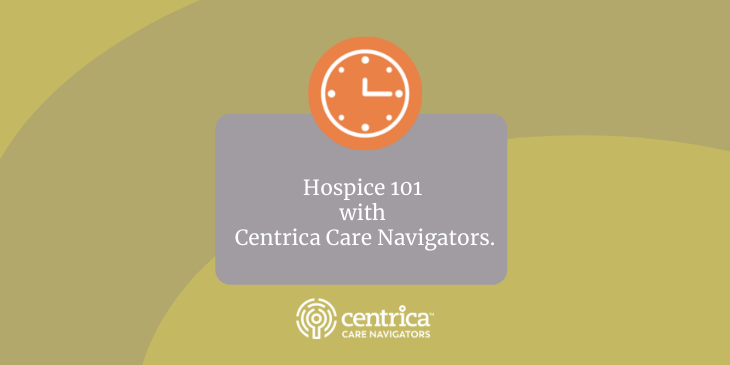Hospice 101: How You Make Life Easier for Your Loved One
Hospice is the care that people receive in the days, weeks, and months before death. If someone is expected to live six months or fewer, they can turn to the experts at Centrica Care Navigators for assistance. Our team of specialists works hard to give every patient a comfortable and less stressful end-of-life experience.
Though it’s end-of-life care, hospice isn’t “where people go to die.” Instead, it’s a great opportunity – a chance for every individual to make their last few days and weeks a time to treasure. It’s a careful, planned “letting go,” not a sudden “giving up.”
Who is hospice for?
Hospice is for everyone with a serious illness: a condition like cancer, heart disease, or dementia. Doctors and medical staff develop a plan of care for each patient, with the consent of the patient and others. They talk about nutritious food and treating pain. They discuss where each patient should be to receive the attention they need: at home? In a hospital? Somewhere else?
Each person’s loved ones and friends often contribute too. Caregivers help with regular activities like feeding and dressing. With the support of hospice aides, they can also manage personal care like baths and changing bedsheets, and keep each patient’s body moving with simple exercises.
Hospice is designed for those at the end of their lives, people with an illness that can’t be cured or people who don’t want more medical solutions. People with a serious illness who do still want treatment receive palliative care, which is designed for people who are expected to live for more than six months.
Care at the right time
Death and dying is something few people want to talk about. It makes us uncomfortable, and as a result there’s sometimes no plan in place when a person is diagnosed with a life-limiting illness. Doctors and family members are forced to make decisions that might not be what the patient wanted for their own life.
The longer a patient has in hospice care, the more opportunity caregivers and medical professionals have to manage pain and build relationships with patients. The more time a person who needs hospice care is in hospice, the more time they can benefit from the experience and comfort Centrica Care Navigators provides.
A plan of care where you live
Hospice professionals work with doctors and others create a plan of care customized to each person’s wishes, which can include but isn’t limited to:
· Necessary medical treatment
· Help with the day-to-day activities of life, like bathing and using the toilet
· Regularly scheduled visits with volunteers
· Chaplains for spiritual and emotional support if desired
Care isn’t limited to those in a hospital bed, either. Most people can stay in their own homes while they are in hospice care. Some need more regular care, which Centrica Care Navigators provides in our two hospice sites (Rose Arbor Place in Kalamazoo and Glenn Arbor Place in Battle Creek).
Grief support for those in need
Hospice care doesn’t have to end with the death of a patient. Grief support for Centrica Care Navigators continues for more than a year after the loss of a loved one. Small groups (including Journeys, a special age-appropriate group for children and teens) meet regularly to discuss their feelings and move through the grieving process.
Guidance for grieving is also here on our website. It’s saying goodbye and managing funeral arrangements, but it’s also a time for you. Don’t forget that you have to live even though someone close to you has died.
Hospice can be confusing or frightening, but it doesn’t have to be. Hospice helps more than 1.5 million Americans each year have a more comfortable, less stressful end of life.
There’s much more to hospice than sitting at a bedside for the few days before death. There are resources to help you, no matter where you and your loved ones are in your experience with serious illness. You can learn more by exploring our website or calling Centrica Care Navigators at 269.345.0273.
Our Mission is to guide and support individuals and their caregivers coping with illness, aging, dying, and loss by providing compassionate medical, emotional, spiritual, and personal care.




